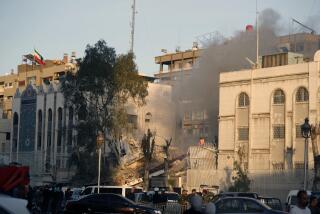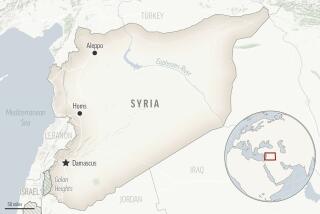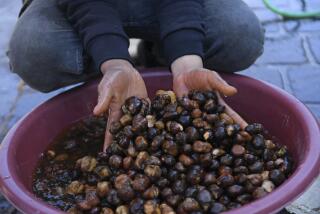Syrian general assassinated in Damascus
A Syrian general was assassinated Saturday outside his home in Damascus, the capital, the official state news service said, as violence continued to rage in the central city of Homs and elsewhere in the country.
Three gunmen waited for Brig. Gen. Issa Kholi and shot him as he left his residence, the Syrian Arab News Agency reported.
The slain general, a senior military physician who headed a Damascus hospital, was believed to have been one of the highest-ranking military officers killed in the almost year-long conflict.
The government blamed “an armed terrorist group” and said the slaying was part of a pattern of targeted killings of doctors, engineers, professors and other intellectuals. The government has depicted the opposition as a gang of militants seeking to impose their intolerant views on Syria’s diverse population through violence.
The assassinated general, said Andrew Tabler, a Syria expert with the Washington Institute for Near East Policy, was a member of an influential family of President Bashar Assad’s Alawite sect, a small Shiite offshoot, which dominates the security services. The rebellion against Assad’s rule is rooted in Syria’s Sunni Muslim majority, and the uprising has a pronounced sectarian subtext.
The slain physician, Tabler said, was also a relative of Mohammed Kholi, a former air force intelligence chief under Hafez Assad, the president’s father and predecessor.
A spokesman for the rebel Free Syrian Army denied that the insurgent force was involved in the general’s assassination.
“At this point, we need as many doctors as possible to treat wounded Syrians,” said Lt. Khalid Hamoud of the Free Syrian Army, reached by telephone in Turkey, where the group is based.
Assassinations, some with sectarian overtones, have been a frequent — albeit relatively little-noticed — component of the Syrian conflict. Each side has accused the other of targeting individuals.
The Syrian government has sought to draw parallels between the current rebellion and an unsuccessful uprising three decades ago led by the outlawed Muslim Brotherhood, a Sunni group. The Brotherhood was accused of carrying out a campaign of assassinations targeting university professors and other professionals before the government of Hafez Assad crushed the rebellion.
Elsewhere in Syria, the opposition reported new shelling and clashes in Homs, leaving at least a dozen dead, said the Local Coordination Committees, an opposition network. Nationwide, at least 30 people died in the conflict Saturday, the group reported, including 13 in the southern province of Dara, where the rebellion began with simple protests almost 11 months ago.
Since Feb. 4, the opposition network says, almost 700 people have been killed in Syria, including more than 400 in Homs.
The official news agency reported that authorities “pursued armed terrorist groups” in Homs’ Bab Amro neighborhood, which the opposition says has been heavily shelled, causing many casualties. Authorities dismantled explosive charges “planted by the armed terrorist groups in the neighborhood,” official news reports said.
Meanwhile, residents of Syria’s commercial hub, the northern city of Aleppo, were said to still be reeling from twin car bombings Friday that left 28 dead and hundreds injured in a city that previously had been spared the violence ravaging much of the nation.
“Everything has gone up in price, except for human lives,” an Aleppo taxi driver remarked Saturday while driving through the crowded Seif Al Dawle district.
The government of Bashar Assad blamed “terrorists” for the Aleppo bombings, which targeted military and police posts. The opposition denied any role in the attacks and said the Aleppo strikes — like previous bomb blasts in Damascus — probably were set off by the regime in a bid to discredit opponents.
In a fresh move on the diplomatic front, Saudi Arabia was reported to be preparing a new resolution for the United Nations General Assembly condemning the Assad government. But Russia, which joined China last weekend in vetoing a draft Security Council resolution endorsing a plan calling on Assad to cede power, indicated Saturday that it would not vote for any “unbalanced” proposal.
Across the border in Lebanon, authorities reported another day of sectarian clashes in the northern city of Tripoli, where the violence in Syria has resonated in two rival neighborhoods and pitted pro-Assad Alawites against anti-Assad Sunni Muslims. The violence in Lebanon erupted Friday and continued Saturday, when three people, including two Lebanese soldiers, were injured, according to the Beirut-based Daily Star newspaper.
Special correspondent Rima Marrouch in Beirut contributed to this report.
More to Read
Start your day right
Sign up for Essential California for news, features and recommendations from the L.A. Times and beyond in your inbox six days a week.
You may occasionally receive promotional content from the Los Angeles Times.






